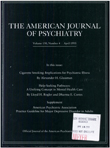Disturbances of hypothalamic-pituitary-adrenal axis functioning during ethanol withdrawal in six men
Abstract
OBJECTIVE: Excessive exposure to glucocorticoids can have neurotoxic effects. The behavioral, cognitive, and neurochemical changes observed following the cessation of heavy drinking, therefore, may be associated with disturbances of the hypothalamic-pituitary-adrenal (HPA) axis. To investigate HPA axis disturbances during the ethanol withdrawal syndrome, the authors examined diurnal changes in plasma cortisol in six alcohol-dependent men following the abrupt discontinuation of alcohol intake. METHOD: Plasma cortisol concentrations were quantified every 30 minutes for 24 hours in the early stage (1 day after cessation) and the middle to late stage (3 days after cessation) of the ethanol withdrawal syndrome as well as after the resolution of acute symptoms (8 days or more after cessation). RESULTS: Plasma cortisol concentrations were almost twice as high during acute withdrawal as they were following recovery. The duration of the cortisol diurnal cycle on the first day of withdrawal was negatively correlated with the severity of withdrawal. CONCLUSIONS: There is a marked activation of the HPA axis associated with the ethanol withdrawal syndrome. The authors hypothesize that this activation may account for some of the signs and symptoms of acute and subacute withdrawal. They discuss the potential long-term physiological effects of the episodic increases in cortisol associated with repeated episodes of ethanol withdrawal. The alterations in cortisol rhythmicity during early withdrawal may also have clinical implications.
Access content
To read the fulltext, please use one of the options below to sign in or purchase access.- Personal login
- Institutional Login
- Sign in via OpenAthens
- Register for access
-
Please login/register if you wish to pair your device and check access availability.
Not a subscriber?
PsychiatryOnline subscription options offer access to the DSM-5 library, books, journals, CME, and patient resources. This all-in-one virtual library provides psychiatrists and mental health professionals with key resources for diagnosis, treatment, research, and professional development.
Need more help? PsychiatryOnline Customer Service may be reached by emailing [email protected] or by calling 800-368-5777 (in the U.S.) or 703-907-7322 (outside the U.S.).



